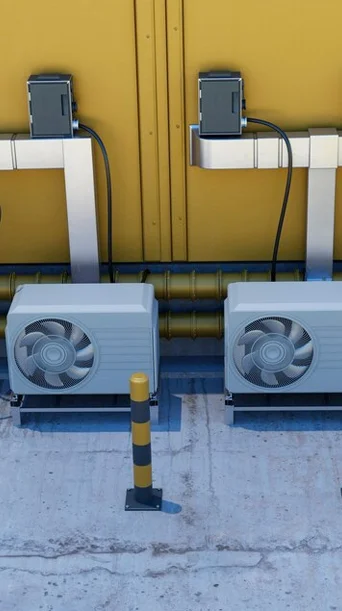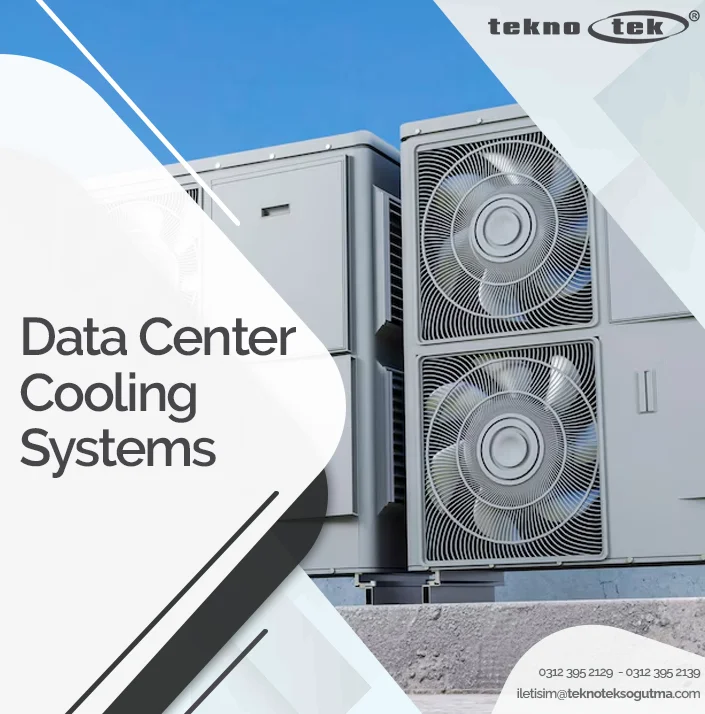Data center cooling systems are systems that ensure the safe and efficient operation of IT infrastructure. These systems should be optimized in terms of energy efficiency and environmental impact, with a focus on sustainability.
Data center cooling systems account for a large portion of energy costs. Therefore, they directly affect operational expenses. For this reason, these systems should be designed to consume minimal energy using proper engineering approaches.
What Is a Centralized Cooling System?
Centralized cooling systems, used in high-energy-consuming and heat-generating structures such as large-scale data centers, provide efficient and integrated cooling solutions. These systems are typically operated from a central point and meet the cooling needs of the entire building. They achieve this by distributing cold air or cooling fluid.
The advantages of centralized cooling systems are as follows:
- They provide energy efficiency. All areas are managed from a single point, optimizing energy use.
- They reduce operational costs. Since the system is centrally managed, it is more economical to maintain and operate.
- They have high cooling capacity. They offer better cooling in high-density and high-performance environments.
- They ensure efficient heat transfer. With liquid cooling systems, heat can be removed more quickly and effectively.
- They enable long-term energy savings with space efficiency. Centralized systems take up less space compared to individual units. Systems that utilize free cooling and natural cooling reduce energy consumption.
- Centralized systems offer high levels of control and automation. These systems can be monitored and managed remotely via advanced software.
- They are environmentally friendly thanks to their energy-efficient design.
- They make use of climate conditions. Systems like air-cooled or free cooling can operate in accordance with outdoor conditions, increasing efficiency.
- Another advantage is maintenance convenience. Thanks to their centralized structure, all components are easily accessible for maintenance, offering a practical solution.
A centralized cooling system is a comprehensive cooling system. At the same time, each component supports the overall energy efficiency of the system. With modern data center cooling systems, it is possible to reduce costs and achieve sustainability goals.
Working Principle of Centralized Cooling Systems
Centralized cooling systems are integrated systems that meet cooling needs from a single point through the coordinated operation of various components. These systems typically include cooling towers, chiller units, pumps, and distribution lines.
Chiller cooling is at the heart of the system. With the help of cooling fluid, it expels the heat absorbed from the environment, thereby enabling heat transfer. This system operates efficiently in data storage areas with high-density hardware, directly contributing to the system’s performance.
One of the initial steps in centralized cooling system solutions is optimizing airflow. The cold air produced in the system is directed to the required areas via specialized channels. Among the systems used, liquid cooling operates with higher efficiency, thus providing energy savings.
Additionally, outdoor air can be utilized through free cooling and natural cooling techniques. This reduces the system’s energy consumption and improves energy efficiency.
These systems, used in large-scale data center structures, prevent overheating of high-performance devices. As a result, hardware lifespan is extended, and overall energy efficiency is enhanced.
Considering all these factors, understanding the principles of modern cooling systems correctly is crucial for building sustainable and cost-effective infrastructures.
For more detailed information about data center cooling systems, you can contact Teknotek.


